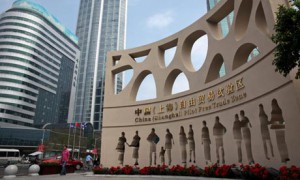
Photo credit: Wu Hong/EPA www.theguardian.com
The China (Shanghai) Pilot Free Trade Zone (CFTZ) announced October 1, 2013 could be seen as China taking steps slowly and cautiously towards a more open, free trade market economy. Enthusiasts were looking to the CFTZ as a pilot of new reforms that would see full renminbi convertibility, the relaxation of restrictions on capital account transactions, full access to the internet and unfettered foreign investment ownership in industries operating in the free trade zone.
Despite much anticipation, it seems China is moving with significantly less speed than was first hoped, as authorities aim to evaluate risks and closely monitor the outcomes of activities undertaken in the CFTZ. However, this pace does not mean companies engaged with doing business with China and Asia should lose sight of the potential ramifications of the CFTZ as part of an Asian business strategy. Equally important to watch is the speed at which this test bed of reformation spreads to other parts of China and the regional competition for foreign investment that’s sure to develop.
First Mover Advantage
You have to love the zeal in which some enterprising Chinese are purchasing business licences in the newly created CFTZ – not in the hopes of running an actual ongoing business – but in speculation of selling, at a profit of course, the rights to operate a business should the promises of the CFTZ become a reality.
While the zone’s potential is uncertain for the time being, the next three months or so should be telling as the Chinese authorities continue to issue policy changes and clarification on what activities can, and can’t, be undertaken. A negative list of restricted and prohibited sectors was released last year. Now there is talk of this list being revised in 2014. Some benefits for businesses are already starting to take shape. Sectors with previous restrictions on foreign ownership are gradually being opened. For example, some internet and data services will soon be able to have up to 55% foreign ownership. Home internet and call centres are also slated for foreign participation. The provision of these services can include other parts of the mainland but the condition will exist requiring the business infrastructure to reside in the CFTZ and some activities like home internet will remain confined to the zone for the time being.
The Chinese government has also made attempts to communicate certain tax advantages for companies running cargo and small value-add services in the zone. Improvements in warehousing of goods and faster custom clearance times will allow companies to move goods into the zone for exhibition and warehousing, cutting down on transportation and sale cycle wait times for the region. The expectation for reducing wait times for customs requirements is likely to go from as much as one month in some cases down to three-to-four days. Yet one shouldn’t be expecting that there will be much leakage of tax and duty benefits between the rest of mainland China and the CFTZ. The same can be said for the reforms announced to date granting easier access to currency convertibility and transfer within and out of the CFTZ. But even some Chinese officials hint that in order for the CFTZ to effectively compete with the likes of Hong or other major trade centres, the Chinese renminbi needs full convertibility for capital account transactions such as foreign borrowings and investments.
Foreign companies operating time sensitive supply chains within Asia could see the zone grow into a reasonable alternative to Hong Kong – something China is no doubt trying to orchestrate over the medium term. Competition concerns from neighbouring regions are already on the rise. And just this month the creation of some 12 similar zones in places like Tianjin are said to have been granted approval by China’s central government.
Fad or new path forward? It’s worth closer careful watching.
Want to Know More?
You can read more about China’s free trade future regularly on this blog.
Exporters should talk to lawyers and banks active in the CFTZ, Canada’s Trade Commissioner Service, and the China Canada Business Council for more information and advice.
Information is also available through China’s free trade website.
For a more in depth look at the business environment, download EDC’s Doing Business in China guide.
